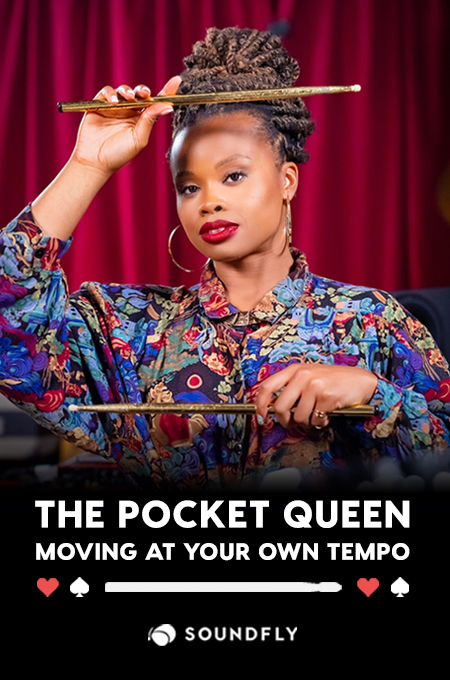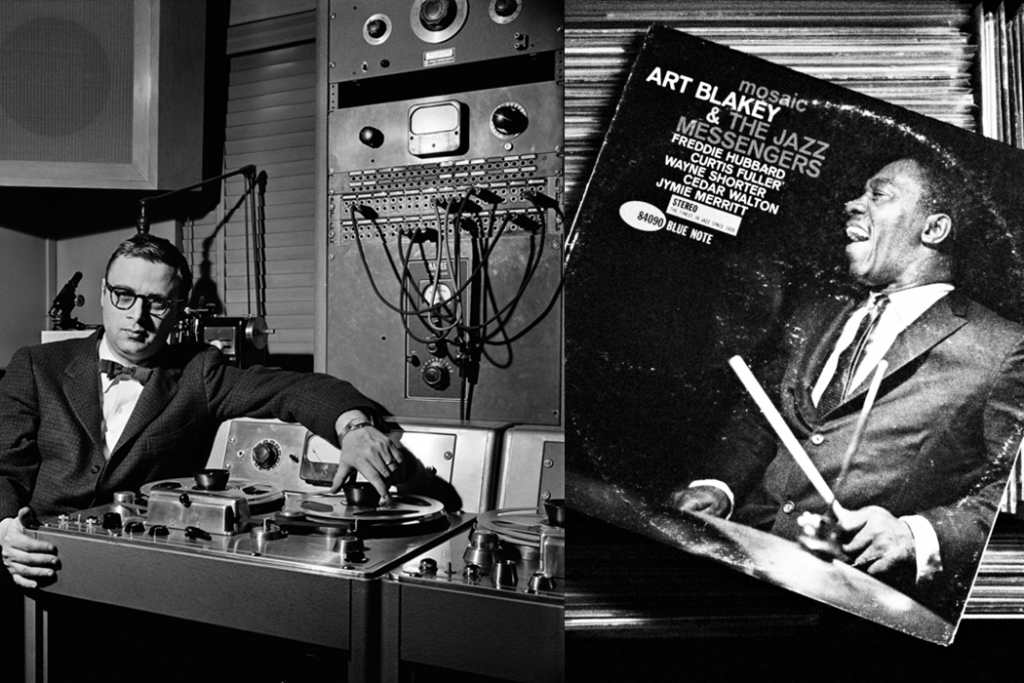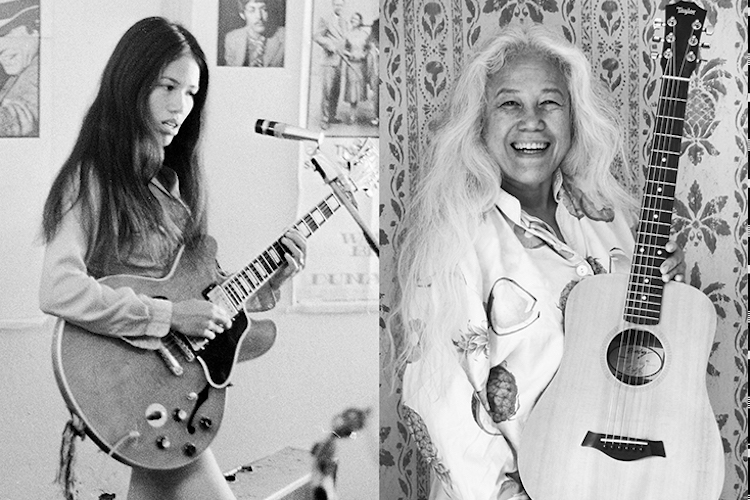
It’s 8pm on a Wednesday evening, and a pixelated June Millington waits patiently on Skype as I pull up a write-up of her massive autobiography, Land of a Thousand Bridges (published by No Depression). As I scroll through the summary of the 500+ page book, I realize with some trepidation I’m about to interview a rock ‘n’ roll goddess (or, as she puts it, a “foremother”).
Originally, the interview was supposed to take place with Ann Hackler, June’s longtime partner and co-founder of IMA (Institute for the Musical Arts), a non-profit institute for girls in music in Goshen, Massachusetts where young women learn songwriting, band-building, engineering, production, and song performance. I had watched Ann’s TedXTalk, “Leading from the Kitchen” multiple times to prepare, but Ann had come down with the flu, and in this last-minute twist of events, I found myself suddenly face-to-face (or screen-to-screen) with the first lady shredder to release an album on a major label.
June Millington’s band Fanny was one of the first notable bands to be made up entirely of women, the third to sign with a major label. They achieved two top singles on the Billboard Hot 100 and released five albums. Over the course of their storied career, they played the Fillmores East and West, the Sonny and Cher Show, recorded at the Beatles’ studio in London, played with the Staple Singers, and were produced by Richard Perry and Todd Rundgren. June suggested I read her book over asking for her full biography in person, so we decided to focus on music education, advice for musicians, women in music, and June’s personal influences.
June offered up a selection of her favorite, legendary performers to provide a soundtrack to her interview. Click play below or visit the playlist anytime here.
—
At what point did music become more than a hobby to you? You said when you were a teenager you knew what you wanted to do. What was your “aha” moment, when you realized this was the one thing you had to do?
I heard a guitar, and it’s not an exaggeration to say I was completely galvanized, like I’d been hit by lightning. I heard the sound from a classroom down the hall from me; I went down the hallway, and there was a girl I’d never seen before, I’d never see again — I think she was an angel, sent to me. She was playing the guitar and I stood there at the door. She was the only one in the room, just by herself. This is in the Philippines, at an all-girl Catholic Filipino school.
How’d she sneak an electric guitar in?
It was an acoustic. I heard it from down the hall and I kind of feel like my angels or my ancestors sent me that message, like, “this is how you get to where it is you didn’t even know you wanted to go. Here is your freedom.” And I had to get a guitar. My mom bought me one for my 13th birthday and in short order, my sister and I were playing guitar on the way here from the Phillipines.
When did you start playing with the band?
[My family] got here in ‘61, and [my sister and I] met two girls in junior high who also sang; they became our friends through music. Since we’d come from the Phillipines, everyone else was ignoring us. And we played a talent show in ‘62. I’d written a song called “Miss Wallflower of ‘62”, which we played with four acoustic guitars, singing in our bobbysocks outfits. The crowd loved it — we couldn’t even believe it!I think everyone’s an artist, and if you’re lucky, you will find that thread in your life. Not everyone does. I think about that a lot, when I see people who are grumpy and unhappy, and I think, there’s a place in you that’s genius, you just haven’t touched it yet.
You talk about all of these amazing experiences you got to have with the band, what was your hustling move? What was it that you did in order to be able to simultaneously make money and make a name for yourself?
Well, I guess that you’re making a presumption that from starting a band in ‘64 to getting a record deal in ‘69, we somehow just jumped to that. That period was like the dark ages. It was as if we were putting out a light but there was no reflection coming back. Either they [the industry] didn’t see it, because they didn’t know what they were looking at, or they rejected it, because it just wasn’t done [by women].
In ‘64, Jean and my mom, Yolanda, went with us to the music store to sign for our gear, which was about $400-500, which in ‘64 was a lot of money. We paid it all back within a year, because we started getting gigs at high schools, bowling alleys, fraternity parties, military spaces (due to the Vietnam war), and teen centers. Between ‘64 and ‘69 not only did we learn how to play, we bought our own equipment, we learned how to set up and run our own P.A., we learned new songs from the radio every week, because, in order for people to dance, you had to play “Do You Believe in Magic”, or “My Girl”.
We did gig after gig after gig. Sometimes we played three gigs in one night. And it was really common to play five sets a night when we played clubs in the summers. I hardly even understood it. All I knew was that we were entering an era of liberation, and playing music was a big part of it. It felt so good. Just the reaction from the audiences, once they realized [after sneering at us] that we could really play.
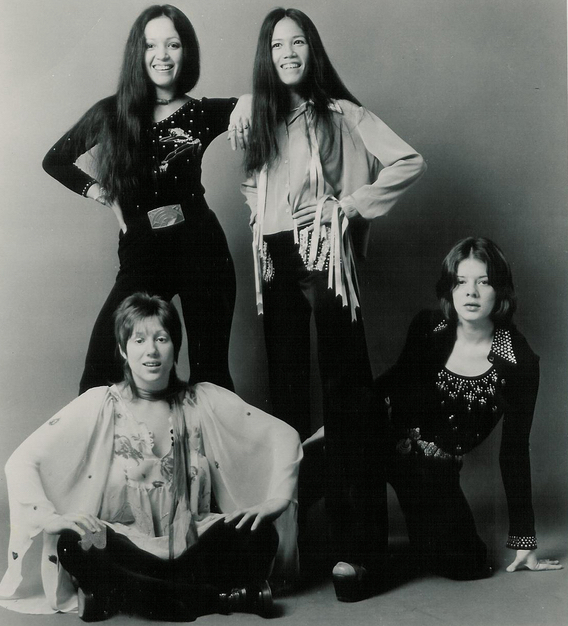
Switching gears, can you tell me a but more about the Institute? What’s the IMA’s mission?
To help girls in every way we can, both by giving them information and by serving as mentors.
What classes do you teach?
It depends on that particular camp [ed. note: two 10-day-long teen performance camps, two 5-day pre-teen explore rock camps, and one 10-day recording camp are held annually. Find more about IMA’s programs here]. I teach arranging, writing, “Music as a Second Language,” [history of our] foremothers, and what I call “direct transmission.” The direct transmission part is super important to me. Because it’s the weight… not only of the information I’ve gotten, but the type of dignity that requires standing your ground and believing in yourself without being an egomaniac. I talk about taking care of yourself; about eating right and getting the right amount of sleep — all sorts of practical stuff. These are things I learned over 50 years of writing, playing, arranging, recording, producing.
When I was with Fanny, sometime before the end of the ’70s, I really had to do a lot of stuff, before it was even “hip” or “a thing.” I wanted to do it all, quite frankly. I wanted to produce at a time when you hardly saw any women in the studio, unless you were the girl singer.
How do we effect change? By doing what we’re doing! We gotta know who we are! We gotta have each others’ backs. Without that we don’t have the power. Our power is in doing it together. It takes a village! It’s not just one girl fighting against the system, or one woman. And it is not easy. But here we are.
On that note, what, if anything, has changed in terms of barriers to women in the music industry from when you were playing with Fanny in the ’60s and ’70s to now? And what do we as women musicians, producers, and businesspeople need to keep doing in order to ensure there are more opportunities for women in this sphere?
Well, what we are doing at IMA is what we need to do. You can’t just get power without some kind of structure, a community and some understanding of what power means! All I can say is that what we’re doing is what needs to be done.
I was just on a panel with 5 or 6 punkers including Kristin Hersh and Alison Beck at Smith College. I had never seen any of these women before. I was so happy to see them because I had never known that they were going to exist! To know that would have meant so much to me — that I was going to see even ONE other girl playing electric guitar in the late sixties. The lead guitarist in the band Birtha — hardly anyone remembers that band, they were kickass. We met them in L.A., and then Bonnie Raitt. For the longest time Bonnie and I were the only ones. We would run into each other, we remained friends, introduced each other to people.
How do we effect change? [laughs] By doing what it is that we’re doing! We gotta know who we are! We gotta have each others’ backs. Without that we don’t have the power! Our power is in doing it together. It takes a village! It’s not just one girl fighting against the system, or one woman. And it is not easy. But here we are.
When the girls form their bands and start writing together at IMA, are there ever situations where they don’t get along? How do you help them see beyond that stuff?
We tell them to talk, and get through it together. To learn that you’re gonna get through to the other side, or maybe you decide not to be friends, or that you’re friends but you can’t be in a band together. The main thing is to know that you can communicate and you’re gonna get through this, or you should at least have the attitude that you’re gonna get through this.
Some of the girls come in and they’ve already written songs, they have perfect pitch, or they’ve got this incredible talent, but they’re really anxious or have any number of issues. It’s really important for them to know that they have to interact — they have to get through. No solo acts — it has to be an ensemble. What happens when you do that? You have to communicate. You got to learn how to shape sound; learn how to shape a show; you’ve got to realize that the sound person is the other member of band. These are things they’ve never done before.
If you want to be a leader, you have to accept power, which means people might not like you. You have to be willing to negotiate tender places, but you have to be firm — and understand boundaries.
Have you seen that movie Whiplash?
No, but I heard about it
So there’s that strict Berklee/Juilliard model of teaching, and then there’s the model that Ann talks about in “Leading from the Kitchen”, and the importance of nourishment and nurturing. What parts of music teaching do you think should come from structure, and when should it come from that place of nurturing?
It depends on the person. When someone comes to me, or when I find something they’re scared of, I’m going to feed them. Because it’s not just, “OK, here’s your pentatonic scale.” Sometimes I have to un-teach whatever it is they’ve learned, such as slapping the pentatonic scale over EVERYTHING! I find it almost an insult to hear. You mean your teacher didn’t tell you? To listen to what’s happening? It’s like someone taught you the sentence “Hi, how are you, I’m a musician.” And everything you hear, that’s what you’re gonna answer back. So someone asks you, “What did you have for dinner?” “Hi, how are you, I’m a musician.” That’s the pentatonic scale. Just slap it over everything! Oh my god, it makes me nuts!
We’re very protective. I feel like the Magical Queendom has got to be the Magical Queendom. [Sometimes the girls will say] “I didn’t know it could be like this, I didn’t know I could be friends with girls!” Fundamentally, there is something girls do together that is unique to girls. And there’s a lot of research being done on that now because of body issues and the need for antidepressants… that’s part of what we deal with here, just by giving girls information, giving them standards, giving them role models, letting them borrow equipment. It’s not just that one chord you’re going to learn from me, it’s your whole life!
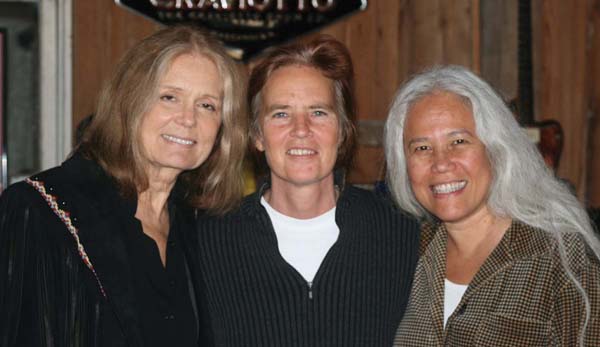
What do you think makes a good bandleader? Is that something you can teach?
There are a couple of things we pass onto the girls:
- If you want to be a leader, you have to accept power, which means people might not like you. You have to be willing to negotiate tender places, but you have to be firm — and understand boundaries.
- Be empathic, and have a dialogue.
And I don’t know which comes first: being empathic or setting boundaries, but you really do have to take charge. One of the things I’ve learned since Fanny has been to let things go as long as we get to try my idea once. Like if I say, “well, let’s go to the bridge here” and everyone else is like “oh, you idiot!”… as long as we try it and I can hear it, I’m cool. Because sometimes we try it and immediately I realize it sucks.
Being a leader is tough because you have to learn the art of negotiation. It helps if you can lead the person into thinking it’s their idea. Or, ask “how would you feel if we…” or “how would you feel about it?” The minute you bring somebody into the space of “we’re doing this together,” there’s a lot less resistance. Because if you just try to boss people around it ain’t gonna work, unless you’re paying them very well. There’s another way to do it: just pay them. A lot of times, I’ve wished I could just pay everybody not to overact onstage. Real professionals don’t try to act like some special, private joke is happening.
Can you talk a bit about production and engineering at IMA, and your own experience? What is it like working with women who have never seen a mixer before?
We do it the first night. We have the sound person take them through the board. They take turns trying out the faders and understanding what the parts are. Hands-on [training] is super important. Suddenly they’re all dying to run their own P.A.! You put their hands on the reins, and they often get up the next morning at the P.A. singing their favorite songs. So with the P.A. there’s power, and they understand they have to understand the P.A. in order to do that which drives their passion.
When you’re in love, everything’s beautiful. Same thing with music! When you’re on that musical high — when the girls at camp sing their favorite song, there’s no separation: right away they’re happy. Music takes away the illusion of separation, and that’s what love is.
What do you think the relationship is between music and love?
I don’t think you can really separate them. Because they have that indefinable vibration which is so powerful it’s beyond you. When you’re in love, everything’s beautiful. Same thing with music! When you’re on that musical high, and you’re singing your favorite song, like when the girls sing “Royals” together at camp. There’s no separation: right away they’re happy. They look at each other, and that fear they had a second ago is gone! It takes away the illusion of separation; that’s what love is.
Do you believe everyone is an artist, or that anyone can be a musician?
I don’t believe anyone can be a musician. But I think people are artists in many different ways. Look at Steve Jobs; his first thing was calligraphy. Who knew that he was going to build the empire that we’re using right now [our MacBooks]? I think everyone’s an artist, and if you’re lucky, you will find that thread in your life. Not everyone does. I think about that a lot, when I see people who are grumpy and unhappy, and I think, there’s a place in you that’s genius, you just haven’t touched it yet. Or when you touched it, you didn’t have enough courage, or you didn’t have enough support to actually do it.
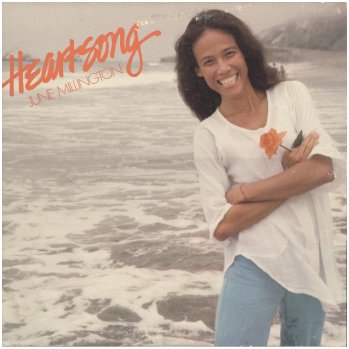
Can you talk a bit on some of IMA’s successful alumni?
Hannah of And the Kids is very special. I saw them at the Amourasaurus Festival here in Northampton a few months ago, with Lake Street Dive (big IMA supporters) and all these other great bands. Afterwards, I said to Hannah, “I really like your sound. I like how you play.” She knows I wouldn’t just say that. I didn’t give it up for a long time. It used to be: “Why did you miss that great solo you practiced? What happened that you lost your focus or you lost your nerve? You didn’t practice the chord?” Well, it takes work! It takes discipline!
What advice would you give to other women looking to explore their own unique sound as a musician?
Well, you gotta keep at it. I think that discipline is really important. So if something doesn’t work, pick yourself up, dust yourself off, and keep going. Because there are going to be lots of things that don’t work or that you didn’t know you didn’t know. So you have to have resilience, determination, and flexibility all at the same time.
And I say this over and over and over: why don’t you learn the repertoire of what came before? Why don’t you learn some Sister Rosetta Tharpe guitar licks? Let’s listen to the repertoire, let’s learn the form licks. Stop and take a listen.
Can you give us some more examples of that canon?
Well if you’re going to listen to players like Sister Rosetta Tharpe, then you really gotta look at the three Kings: Albert King, BB King, and Freddie King. Fred Mcdowell would fall in that canon: all the blues greats. I would listen to Mavis Staples and the Staple Singers. She’s somebody who knows the repertoire, who grew up with a church repertoire to begin with! And if you’re going to listen to Aretha Franklin, you’ve got to listen to Sam Cooke. Lots of solid choices, so learn the repertoire.
If you’re gonna get into singers, you should listen to Sarah Vaughan. Notice how she uses her entire head, her tongue… She’s able to hold a note and emote, whereas a lot of girls now think you gotta do all these gymnastics. That you gotta lead into a phrase by doing this (growls raspily). That little sound.
The vocal fry?
These little affectations — why do you have to do those gymnastics? Why can’t you hold the line? Did you know that you could either use vibrato, or not? Did you know that you could have two people sing in octaves, and it’s incredible?
It’s sort of like cooking, like you’re reaching in for this spice and that, and you’ve got this toolbox…
It’s not so much reaching as intuiting. All of your work comes in, and it’s like rain pouring down on you — you don’t have to try. For me, tone is a lot of it. I can play less because I have good tone. I learned Eagles, Jimi Hendrix, Cream and Steve Cropper lick for lick. I learned the rhythm parts. Then I would start to understand what a lead part or little notes here and there add to the entire piece. [I ask], why that choice? So no matter what I’m playing, even if I make a mistake, I’m still sure of my footing. It was a lot of work to take me to that place, because I now know the records by heart and practiced for all those hours. I didn’t go and f*ck around and drink, people just assumed that Fanny did. We weren’t drunken, drug-addled women.
The music’s gotta come first.
Have your fun, of course! You can’t just be a nun.
If you’re ready to dig into the June-recommended canon, check out our Spotify playlist. Want to be a kickass bandleader like June someday? Start Soundfly’s FREE course Building a Better Band today! If you’re more interested in soloing like a master, The Improviser’s Toolkit (also free) is for you.
—
Update: This article was updated on February 10th with additional detail and clarification from June Millington to better reflect her experiences and work.
Correction: An earlier version of this article misspelled a band June Millington cited as an influence. The band is “Birtha,” not “Bertha” as previously published.
